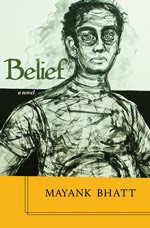Despite the dominating categories of homogenized thinking and action being pressed upon them, the young have the capacity to imagine, to see life in its variety, to see difference as intrinsic to the human race. The Beacon offers them the windows to the ineffable, the imagined, to the possible in the impossible.
Sunday, November 12, 2017
Ashoak Upadhyay's The Beacon
Ashoak Upadhyay is an idiosyncratic man. He’s a leftist intellectual, an economist, a journalist, a novelist and now the editor of The Beacon online magazine promoting long-form writing.
I’ve known him since the early 1990s. He was my colleague at the Observer group, though we worked at different publications, and then he was my editor at Business India, where we routinely argued over matters that, in retrospect, seem so utterly irrelevant.
But he was a great editor to work with. In particular, I remember a report that he conceived and for which I did the field work on the burgeoning entrepreneurialism in Dharavi slum (in those days it was called Asia’s largest slum). Subsequently, another senior journalist turned the idea into a book.
A few years back, Ashoak published his debut novel – The Hungry Edge. It’s a layered tale consisting of stories within stories and is a commentary on urban Indians coping with the changes that globalisation is bringing into their social and moral lives. But it is also about memory and time and their role in shaping our passions and our self-perceptions.(Read an earlier blog about the novel here: The Hungry Edge)
Ashoak is a great guy to be around because he can (and often does) talk on every subject with great erudition. This erudition springs from his being extremely well-read and knowledgeable and also because he is opinionated and biased.
It’s this combination of being expertise and bias that must have led him to launch The Beacon.
I'm sharing a recent email exchange with him where he talks about his website:
What motivated you to launch The Beacon?
The paucity of essay-length writings that are not knee-jerk responses to events as they occur or are boringly academic. Less journalism, even less pedantry, more readability, imaginative analyses, contemplation. Long form writing with long shelf lives that can be read after the contingent moment has passed.
What is it that you're trying to achieve through it
Different ways of seeing and thinking about, our diversities, differences and frailties. Conversations across races, communities, genders and cultures.
In a crowded space will Beacon achieve that you envisage it should?
The space is crowded with platforms or media urging obvious thought, even more obvious actions on the contingent; there can never be enough platforms that make readers think heterogeneously and without the categories they have been told to think with.
And what are you doing to make it more relevant to a younger demographic?
Despite the dominating categories of homogenized thinking and action being pressed upon them, the young have the capacity to imagine, to see life in its variety, to see difference as intrinsic to the human race. The Beacon offers them the windows to the ineffable, the imagined, to the possible in the impossible.
Labels:
Ashoak Upadhyay,
The Beacon
Subscribe to:
Post Comments (Atom)





No comments:
Post a Comment